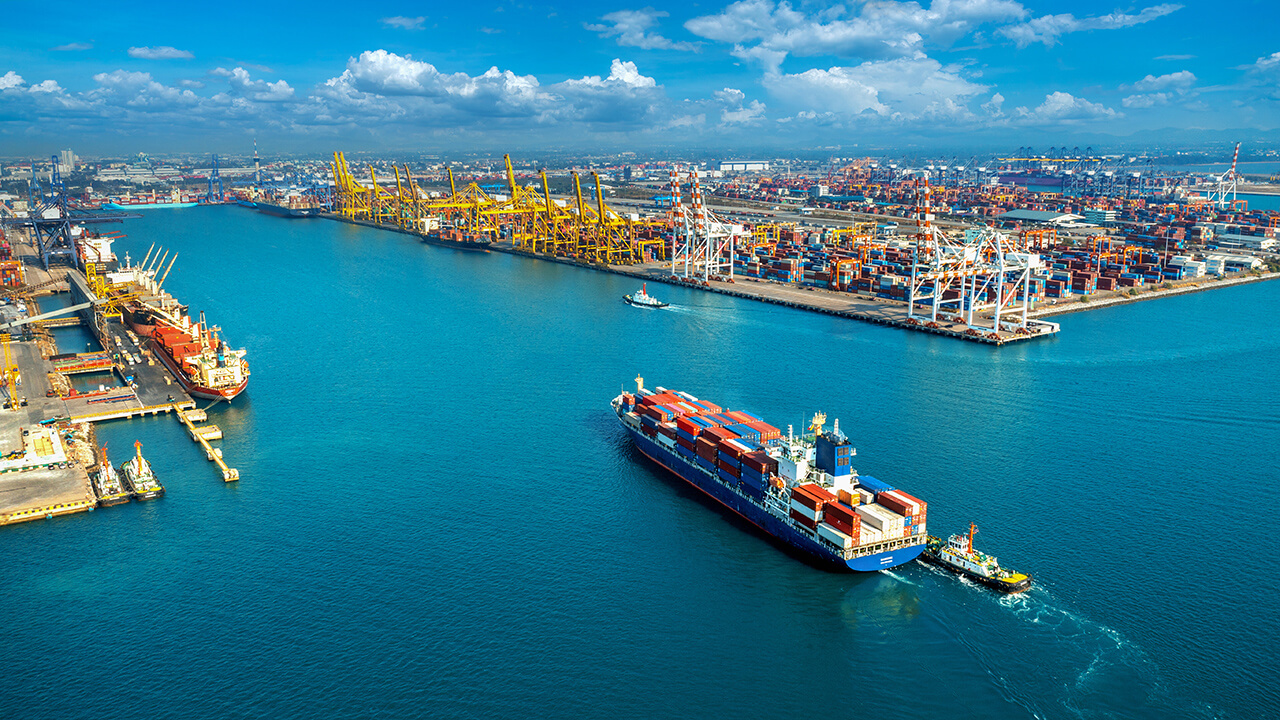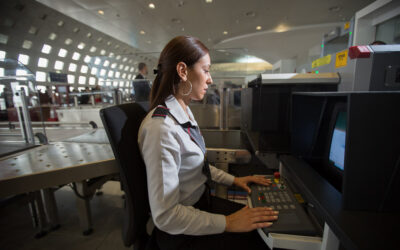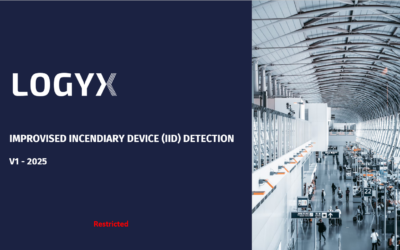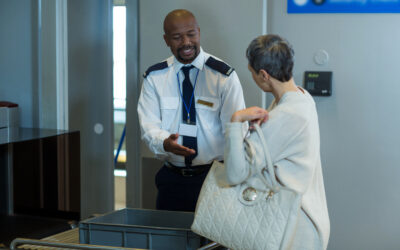This blog discusses the importance of security in ports and on board ships, as well as the regulations and directives related to port security. It also mentions the enhanced security measures implemented by cruise ship companies, such as the use of security scanners and X-ray machines. The training and certification requirements for maritime officers, particularly those working on cruise ships, are also mentioned. The blog highlights the role of LOGYX in providing specialized training for maritime agents and the use of advanced technologies to enhance port security.
Security in ports and on board
Safety in ports is a major concern to ensure the smooth operation of maritime activities and the protection of people, property, and the environment. Maritime agents play a crucial role in managing security in ports. Ports must implement physical safety measures to control access to port facilities. This may include fences, video surveillance systems, access control points, and security patrols. In ports in France and Overseas Territories, there is a genuine desire to enhance access conditions to facilities (surveillance cameras, access badges, gates, and barriers) to strengthen public safety, thereby ensuring the safety of users, staff, and infrastructure.
Ports must comply with international and national maritime regulations to ensure the safety of ships, crews, and cargoes. This includes implementing measures for collision prevention, pollution control, and emergency response. Regulations related to the safety of boats and ships are generally governed by international conventions such as the International Maritime Organization’s Safety of Life at Sea (SOLAS) Convention. Additionally, private security is necessary onboard a ship, and private security agents must comply with national laws and regulations, including those governed by the NCPSA in France.
Regarding regulations and directives on port security, the following are noteworthy:
Directive 2005/65/EC: This directive focused on security measures for ships and port facilities, establishing safety standards for ports and imposing obligations regarding the prevention of unlawful acts.
Regulation (EU) 2017/352: This regulation concerned safety operations in maritime ports, setting minimum security standards for European Union ports, covering various aspects such as ship safety, prevention of unlawful acts, and cooperation between competent authorities.
Directive 2008/114/EC: This directive aimed to strengthen cooperation among EU member states in the field of internal security, including crisis management and prevention of unlawful acts.
Regulation (EU) 2016/679 (GDPR): Although more focused on personal data protection, the General Data Protection Regulation (GDPR) may also have implications for security in ports, especially concerning the management of sensitive information.
In some cases, cruise ship companies have decided to enhance security measures during passenger embarkation and disembarkation at each port of call. These new procedures involve thorough checks of individuals boarding the ship, aiming to ensure the safety of passengers and onboard personnel.
One of the main methods implemented by these maritime companies is the use of security scanners to conduct in-depth security checks. These scanners allow security agents to detect any potentially dangerous or unauthorized items concealed on passengers’ bodies. Additionally, radioscopic devices offer a detailed view of carry-on luggage, personal effects, and even clothing, contributing to enhancing security aboard cruise ships. The benefits of these measures are manifold. Firstly, they enhance the overall security of the ship, thereby reducing the risks of incidents related to dangerous or prohibited items. This also serves as a deterrent to potential malicious acts, reinforcing passengers’ confidence in the safety of cruise travel. Furthermore, these repeated checks at each port of call offer a proactive approach to security. By systematically screening passengers at each new stage of the journey, maritime companies can quickly identify any anomalies or potential threats, allowing for a prompt and effective response when needed.
By implementing these enhanced security measures, maritime companies demonstrate their commitment to protecting their passengers and crew while meeting international safety standards. These initiatives aim to ensure cruise travel is as safe as possible, providing a more serene and enjoyable experience for all passengers onboard.
The training of marine officers
Marine officers must undergo specialized training to understand aspects related to maritime security, port regulations, and emergency procedures. This training, though not mandatory, is implemented by operators to ensure the safety of ships during stops in particularly sensitive ports.
Port operations, such as loading and unloading cargo, must be carried out in accordance with established safety standards. Maritime agents are often responsible for coordinating these operations while ensuring compliance with current regulations. Risk management is essential in ports, requiring maritime agents to be trained in identifying potential risks, assessing possible consequences, and implementing appropriate emergency plans.
Security measures implemented mainly involve the screening of passengers and crew members during embarkation and re-embarkation. Indeed, boats are equipped with security equipment, including metal mass detection gates used to check both individuals and their bags as they board the ship.
The training of marine officers working on cruise ships
The training of a marine officer working on a cruise ship is a complex process that combines academic skills, practical sea training, and operational experience.
Concerning the academic training of marine officers, they typically begin by obtaining a university degree in maritime sciences, marine engineering, or a related field. Some candidates may attend a merchant marine school for more specific training in maritime professions. Subsequently, candidates must obtain maritime certifications that comply with international standards, issued by the maritime authority of the country where they are undergoing training. For example, certifications may include officer of the watch or chief engineer certificates.
Later, candidates must spend a certain number of days at sea to gain practical experience under the supervision of experienced officers. They learn to navigate, manage the ship in different weather conditions, use navigation equipment, etc. Security is a priority in the maritime industry. Marine officers must undergo safety training at sea, including evacuation drills, handling of life-saving equipment, and firefighting.
To work on a cruise ship, marine officers must also be aware of the industry’s specific needs, such as passenger management, navigation in tourist areas, and cruise-related regulations. Customer service skills and emergency situation management are also crucial. Maritime regulations evolve regularly, requiring marine officers to undergo continuous training to stay updated on new technologies, updated safety procedures, etc.
Training with LOGYX
LOGYX offers the opportunity for maritime agents to undergo specialized initial training, safety equipment training to acquire essential knowledge in general and port security. There is also periodic training to maintain already acquired knowledge and skills, conducted on the LOGYX DETECT simulator for skill maintenance. Ports also utilize advanced technologies such as video surveillance, intrusion detection systems, container scanners, and integrated management systems to enhance security.
With LOGYX DETECT, agents have the opportunity to be trained and certified in radioscopic imaging. Personnel have access to training on the use of the latest generation security equipment – 2D single/dual-view and 3D.
The images used for training are sourced from real luggage and come from various partners worldwide, creating exercises that closely simulate real-world scenarios, regardless of the agent’s location or the location to be secured. Training can be conducted in person or online.
Towards the standardization of training
Through its DETECT solution, LOGYX aims to improve the detection capabilities of individuals working in the port industry. Training provided by LOGYX to personnel in various French and overseas ports has demonstrated that performance is increased through training. Training personnel in imaging according to a standardized method helps develop recognition and credibility within the professional community. LOGYX can assist you in this process; let’s get in touch: contact@logyx.fr.



